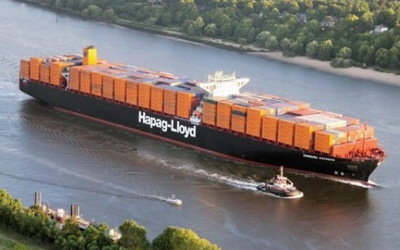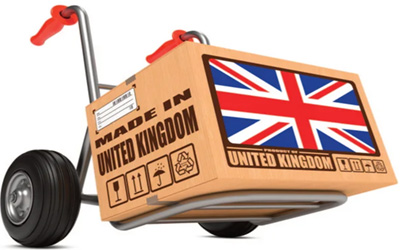Hapag-Lloyd's Bold Move: Launching Bio-fuel Linked CO2 Credits
In a significant stride toward greener and more sustainable shipping, Hapag-Lloyd, one of the world’s leading container shipping companies, has unveiled a pioneering initiative Bio-fuel-Linked CO2 Credits. This innovative program not only underscores Hapag-Lloyd’s commitment to environmental responsibility but also sets a promising precedent for the entire maritime industry.
Navigating Towards Sustainability
The Essence of Bio-fuel-Linked CO2 Credits
 Hapag-Lloyd’s Bio-fuel-Linked CO2 Credits program is a ground-breaking approach that ties together two critical elements – bio-fuels and carbon credits. It aims to mitigate the carbon emissions associated with traditional marine fuels by using bio-fuels and then translating these emissions reductions into valuable carbon credits.
Hapag-Lloyd’s Bio-fuel-Linked CO2 Credits program is a ground-breaking approach that ties together two critical elements – bio-fuels and carbon credits. It aims to mitigate the carbon emissions associated with traditional marine fuels by using bio-fuels and then translating these emissions reductions into valuable carbon credits.
The Power in your Hands
Bio-fuels, derived from renewable sources such as vegetable oil, animal fat, and algae, are a game-changer in the shipping industry’s quest for sustainability. When used in place of conventional bunker fuels, bio-fuels significantly reduce greenhouse gas emissions, making them an ideal choice for environmentally conscious shipping companies.
A Dual-Benefit System
Hapag-Lloyd’s program operates on a dual-benefit system. First, the company utilizes fuels in a portion of its fleet to substantially cut down on CO2 emissions during voyages. Second, the emissions reductions achieved through fuel usage are quantified and translated into carbon credits, which can be traded or sold on carbon markets.
Carbon Neutrality and Beyond
By using bio-fuels and earning carbon credits, Hapag-Lloyd not only achieves carbon neutrality for a part of its operations but also contributes to the overall reduction of carbon emissions in the shipping industry. This proactive approach aligns with global efforts to combat climate change and promotes a more sustainable maritime sector.
Environmental Benefits
 Hapag-Lloyd’s fuel-Linked CO2 Credits program yields significant environmental benefits. By incorporating fuels into its operations, the company helps reduce harmful emissions like sulphur dioxide, nitrogen oxides, and particulate matter, thus minimizing its ecological footprint.
Hapag-Lloyd’s fuel-Linked CO2 Credits program yields significant environmental benefits. By incorporating fuels into its operations, the company helps reduce harmful emissions like sulphur dioxide, nitrogen oxides, and particulate matter, thus minimizing its ecological footprint.
Industry Leadership
Hapag-Lloyd’s innovative approach positions it as a leader in sustainable shipping. Other companies within the maritime industry are likely to take inspiration from this initiative and explore similar strategies to reduce their carbon emissions.
Meeting Emission Reduction Goals
 The International Maritime Organization (IMO) has set ambitious emission reduction targets for the shipping industry. Hapag-Lloyd’s program demonstrates a proactive commitment to achieving and possibly exceeding these targets, thus contributing to a more sustainable future.
The International Maritime Organization (IMO) has set ambitious emission reduction targets for the shipping industry. Hapag-Lloyd’s program demonstrates a proactive commitment to achieving and possibly exceeding these targets, thus contributing to a more sustainable future.
Scaling Sustainability
As the world grapples with the challenges of climate change, initiatives like Hapag-Lloyd’s fuel-Linked CO2 Credits program are essential for scaling sustainability efforts across the shipping sector. More companies are expected to follow suit, accelerating the transition to greener maritime transportation.
Continued Innovation
The program’s success may pave the way for further innovations in sustainable shipping. Hapag-Lloyd’s commitment to reducing emissions through bio-fuels and carbon credits is a testament to the industry’s ability to adapt and evolve in the face of environmental challenges.
Conclusion
Hapag-Lloyd’s launch of the Bio-fuel-Linked CO2 Credits program is a remarkable step toward a more sustainable and environmentally responsible maritime industry. By harnessing the power of bio-fuels and translating emissions reductions into carbon credits, Hapag-Lloyd not only reduces its own carbon footprint but also encourages others to embrace sustainable practices.
As the program gains momentum, it has the potential to transform the shipping industry into a greener and more eco-conscious sector.
FAQs
 Q: What is Hapag-Lloyd’s Bio-fuel-Linked CO2 Credits program?
Q: What is Hapag-Lloyd’s Bio-fuel-Linked CO2 Credits program?
A: It’s an initiative that combines the use of bio-fuels in shipping with the generation of carbon credits from emissions reductions, promoting sustainability in the maritime industry.
Q: Why are bio-fuels important in shipping?
A: Bio-fuels significantly reduce greenhouse gas emissions when used as an alternative to conventional bunker fuels, making them a crucial element in sustainable shipping.
Q: How does the program benefit the environment?
A: By using bio-fuels and generating carbon credits, the program reduces emissions of harmful pollutants and contributes to a greener maritime sector.
Q: What impact does this program have on the industry?
A: Hapag-Lloyd’s initiative positions it as a leader in sustainable shipping, setting an example for others and contributing to meeting international emission reduction goals.
Q: What does the future hold for sustainable shipping initiatives like this one?
A: Initiatives like Hapag-Lloyd’s program are expected to inspire more companies to embrace sustainability, leading to a greener and more eco-conscious maritime industry. Which is why SARR Logistics have partnered up with them.








